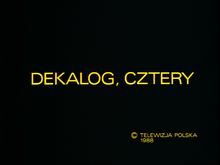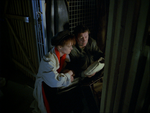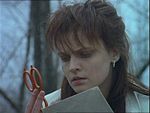- Decalogue IV
-
Decalogue IV 
DVD posterDirected by Krzysztof Kieślowski Produced by Ryszard Chutkovski Written by Krzysztof Kieślowski
Krzysztof PiesiewiczStarring Adrianna Biedrzyńska
Janusz Gajos
Adam HanuszkiewiczMusic by Zbigniew Preisner Cinematography Krzysztof Pakulski Editing by Ewa Smal Distributed by Polish Television Release date(s) 1988 Running time 56 min. Country Poland Language Polish Budget $10.000 The Decalogue - IV (Polish: Dekalog, cztery) is a fourth part of the television series The Decalogue by Polish director Krzysztof Kieślowski, loosely connected to the fourth imperative of the Ten Commandments: Honor thy father and thy mother. Uncertainty about her real parentage complicates the bond between a young woman (Adrianna Biedrzynska) and her father (Janusz Gajos). [1] [2]
Contents
Plot
Anka (Adrianna Biedrzyńska) an attractive acting student lives together with her father, Michal (Janusz Gajos). Her mother has been dead since she was born. They get on well together and have relation of more like friends than like father-to-daughter. Michal travels often on business trips abroad and Anka does not feel home alone without him.
One Easter Monday, after playing the traditional water tricks on each other, Anka drives Michal to one of his trips, earlier that day she had discovered an envelope with her father's handwriting "Open after my death." It is later revealed that she had known about the envelope for years but this was the first time that Michal had left it behind. After a couple of days she finally opens it. Inside, there is another envelope, on which she can read a short message from her mother "To my daughter, Anka." Anka wonders about opening this envelope.
One week later, Michal is back again from his trip and Anka is waiting for him at the airport. He runs happily to her, but she is not happy at all and starts immediately quoting her mother's letter, explaining that Michal is not her real father. Michal is not surprised about this, but also explains that he did not know about the content of the letter neither. He had meant to give her the letter earlier in life but felt that she was either too young or too old and finally decided to leave the letter for Anka to find in order to help the inevitable happening. Anka asks herself if her feelings to her father have been only as a friend and parent, or also to the man, since she somehow felt that she was being unfaithful when going out with other men. Her father admits feeling a man's and not only a father's jealousy against Anka's boyfriends.
Finally, Anka surprisingly reveals the truth. She has not opened the letter but wrote a new one instead, imitating her mother's handwriting after finding amongst her possessions from the hospital a similar envelope. The original envelope remained closed. After a long discussion they decide to burn the letter. However the paper is not burnt completely; they can read part of it which is very similar to the way Anka's fake letter began. The film ends with them trying to read the fragments of the partly burnt letter and completing the missing words: "My dearest daughter: I have something important to tell you: Michal is not... "
Cast
- Adrianna Biedrzyńska - Anka
- Janusz Gajos - Michał
- Artur Barciś - young man
- Adam Hanuszkiewicz - professor
- Jan Tesarz - taxi driver
- Andrzej Blumenfield - Michał's friend
- Tomasz Kozłowicz - Jarek
- Elżbieta Kilarska - Jarek's mother
- Helena Norowicz - doctor
Cast notes
- As in most of the episodes (except 7 and 10), Artur Barciś plays a cameo-observer role, this time as a young man.
- From actors, who appeared in other episodes, we can see briefly Jan Tesarz as a taxi driver, who plays main role in episode 5 (also a taxi driver), also we can see elderly doctor (Aleksander Bardini) from Decalogue II
References
Decalogue I • Decalogue II • Decalogue III • Decalogue IV • Decalogue V • Decalogue VI • Decalogue VII • Decalogue VIII • Decalogue IX • Decalogue X
Directorial works of Krzysztof Kieślowski Feature films Personnel · The Scar · The Calm · Camera Buff · Short Working Day · Blind Chance · No End · A Short Film About Killing · A Short Film About Love · The Double Life of Véronique · Three Colors: Blue · Three Colors: White · Three Colors: RedThe Decalogue Short films Related topics The Three Colors Trilogy Cinema of Poland
Cinema of PolandFilms A–Z • Chronology of films • Interwar • Pre 1930 • 1930s • 1940s • 1950s • 1960s • 1970s • 1980s • 1990s • 2000s
Actors • Directors • Cinematographers • Composers • Editors • Producers • ScreenwritersCategories:- Polish films
- 1988 films
- Films directed by Krzysztof Kieślowski
- Polish-language films
Wikimedia Foundation. 2010.


